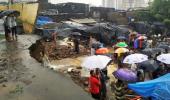More than two weeks after a wall collapsed in suburban Mumbai, killing 30 people and injuring more than 100, Rediff.com's Prasanna D Zore and Hitesh Harisinghani visit the area to find out how the survivors are coping with their lives.

When a 12 feet water wave gushed past a community living atop a small hill, it left behind it mounds of debris, devastated homes, displaced people and 30 deaths.
Deaths of people who don't exist even when they are alive! People, who spring to life in their deaths to prick a city's collective conscience!
Tragedy struck the residents of Pimpripada and Ambedkar Nagar -- two residential colonies separated by some three hundred odd-metres, but along the perimeter of a 25-feet killer wall that collapsed on the outskirts of Mumbai's suburban Malad -- as the Maximum City grappled with torrential rains beginning July.
On the intervening night of July 1-2, at around 12.30 am, a 25-feet wall that separated these colonies from the forest behind it, caved in under the pressure of water that had been accumulating over several days as the city witnessed severe rain.
According to the weather department, the city's western suburbs, of which these two colonies are a part of, saw 309 mm rainfall.
As on July 17, the wall collapse and the resultant deluge has snuffed life out of 30 people and left over 100 injured, and converted hundreds of homes into a mound of muck, broken furniture and cupboards.
"It was a huge water wave that gobbled up lives. From three year olds to 60-70 year olds, this wave spared nobody," says Utkarsh Patil, a graphic designer in his mid-20s and resident of Pimpripada.
While his house suffered some damage, it was not as disastrous as the scene around it. The collapsed wall here is just 10 metres away from Patil's home.
There is a din outside and inside his house at around 2 pm, July 17. Two forest officials, with a list of people who were given cheques of Rs 5,000 by the state government to tide over the crisis temporarily, are cross-verifying the credentials of the recipients.
"People are struggling with this verification as all their documents have been washed away by the flood that night," says Patil.
The mangled remains of his two-wheeler were found 100 metres away two days later, when he and other youth in the colony finally secured some time to locate it after sending the injured to hospitals and those dead for their last rites.
Patil admits he has been luckier than his neighbours who have been struck by death and devastation.
***
Popat Machchindra Kurhade, 39, stays behind Patil's home. His home came in the direct line of the collapse and the water that gushed from behind it. He had no clue what struck him when his house was hit by concrete and a giant water wave.
"My children just disappeared in front of my eyes," he says, trying to hold back his tears.
While some rescuers had taken his wife and son Abhishek to the nearby Vadar Samaj community hall (most Pimpripada residents belong the Vadar caste), his daughter remained untraceable.

"Two days later, the NDRF (National Disaster Response Force) team recovered her body from under the heap of concrete and cupboards, where my house once stood," he says.
Kurhade's daughter Akanksha was just three when she met her watery grave.
A 15-feet natural well, just under the wall that came crashing down in front of Kurhade's house, which had potable water in it, was filled up to the brim with the splattered concrete from the killer wall.

Another resident and a relative of Kurhade, Santosh Jadhav, a mason by profession, is a haunted man.
"We can't sleep here. The memories of what happened that night just don't go away," he says.
Since July 2, there is no electricity, no water, in the locality and the affected people take shelter at their relatives's or friends' homes, at the foothills.
Add to this another problem that the residents of Pimpripada have been facing just to get a glimpse into their miserable lives.
"75 per cent of the residents here don't have access to a toilet," says Jadhav.
"Manasa meli tyacha gam nahi (we are not as unhappy by the deaths of those who died), but the life we live here is no better than hell. This is hell," he says.
"At least give us toilets," he says, knowing well that he could come across as a person insensitive to the death and destruction around him as he demands better living conditions for those alive.
Four people, including his elder brother Sunil Shitiba Jadhav, lost their lives in the tragedy.
Both Jadhav and Kurhade complain that while Chief Minister Devendra Fadnavis announced compensation of Rs 5 lakh to the families of the dead, the officials gave them cheques of Rs 4 lakh only.
WATCH: Santosh Jadhav and Popat Kurhade narrate the ordeal
Jadhav, the most vociferous about the state of being of the residents of Pimpriwada, has only scorn for politicians.
"Whoever we go to with our plight tells us that whatever compensation we got was because of their influence and efforts and they can't do more than what they did," he says.
Before showing us the way to Ambedkar Nagar, another locality that witnessed death and destruction, which is visible two weeks later, Jadhav shares an anecdote about how Pimpripada came into being.
"Most of the Vadars here are expert masons and originally hail from Barshi taluka in Solapur district. Our fathers and their fathers came here as contract labourers to construct this wall," he says pointing towards the breached wall, which was erected sometime between the 1970s and 1980s.
"After constructing this wall our people stayed back; brought their families to be with them," he says.
As the real estate sector mushroomed in the island city, and as employment opportunities increased, more people from Barshi migrated here to work as masons and the neighbourhood sheltered all of them.
"But it is not the same wall that our fathers built," he says again pointing towards the ill-fated structure.
"That wall was declared old and unstable and demolished. In its place this new wall was constructed," he says, again pointing towards it unwittingly.
"And it wreaked tragedy upon us in just 18 months," he says.
***
The way towards Ambedkar Nagar from Pimpripada winds itself through narrow alleys dotted with makeshift FMCG shops, cattle and their scat, pebbled stairways, garbage dumps and mud-filled poodles.
There is every sign of life, but absence of human beings as you plod towards Ambedkar Nagar.

"Take right from a crossroad that has a blue flag raised atop a small, stony monument," Jadhav instructs us.
As you take this right turn and move towards Ambedkar Nagar, with the wall that has created such devastation keeping company, you are hit by the magnitude of what you see.
Swathes of homes, down a sloping landscape, flattened by concrete and water the other night become visible.
Also visible are people inspecting their homes, trying to salvage and recover whatever they could find of value.
And a tonsured father, with a bunch of relatives, performing the lats rites of his dead son, on the ground that once sheltered a family.

Visible also is an undamaged pucca home, few feet away from where the ritual is taking place, of Anant Salvi, that was unscathed as he had rebuilt it just two months ago.
"The water went like a torrent from both the sides. Almost, 10 houses were washed away that night that came in its way. God's mercy saved us," Salvi says.
WATCH: Anant Salvi speaks about the tragedy
***
Anil Narayan Chavan, 45, and his family weren't so lucky. Built on a downhill slope, overlooking tall skyscrapers, his home, and his three-and-half-year-old daughter Lavanya were swept away by the deluge.
Though Chavan got a cheque of Rs 4 lakh as compensation, he is not happy with the way the state government has handled the tragedy.
WATCH: Anil Chavan on the mishap and government's apathy
"The chief minister promised to resettle us, but after that day nothing much has moved on the ground," Chavan says about the apathy of the government machinery.
Chavan says people are opposed to their resettlement in Mahul -- an eastern suburb infamous as 'the gas chamber' because of the polluting factories in the area -- and demands resettlement in one of the many slum rehabilitation projects in Malad.
"The chief minister assured us about our resettlement in SRA (Slum Rehabilitation Authority) projects in Malad, but the BMC (Brihanmumbai Municipal Corporation) denies that SRA homes are available in Malad. According to one list there are 200 SRA rooms available in Malad," he says.
Ask him if he has anything to say to the Maharashtra chief minister and pat comes the reply: "Aamcha faisla lavkar kara (take a quick decision about our resettlement)."
***
Munni Ramakant Goud, who lost her 22-year-old son Sarwan Ramakant Goud, describes how close they were to where their son was buried under the debris.
"We did not know what happened, but my husband, my granddaughter and I lay under the furniture here and my son lay buried there next to us," she says, pointing at two different positions inside her home, or what was left of it.
WATCH: Munni Goud gives details about the fateful night
The tonsured man mentioned earlier, performing the rituals, is her husband Ramakant.
Like Chavan, her request to the state government is "hum ko kuch nahi chahiye, rehne ka ek chat chahiye (we are not asking for much; just give us a place to live)."
***
Amisha Dhenu Jena's story offers some glimmer of joy, if one can call that, amid the gloom that has descended over Pimpripada and Ambedkar Nagar that gives shelter to some 2,000-odd families.
WATCH: Amisha Jena narrates how she survived
Amisha and her father Dhenu, who has been paralysed on one side since last six years, too were swept away by the sheer force of the deluge that came hurtling down the hill.
A henna shrub that lay in the path turned out to be their saviour. Amisha's mother stays in Odisha.
"My father and I clung desperately on to that mehendi shrub till the water flow receded. I got out of the waters in about an hour-and-a-half, but my father who is paralysed had to wait till help came his way," says Amisha, pointing towards the plant lying entangled and uprooted amid the debris of another devastated home.











 © 2025
© 2025